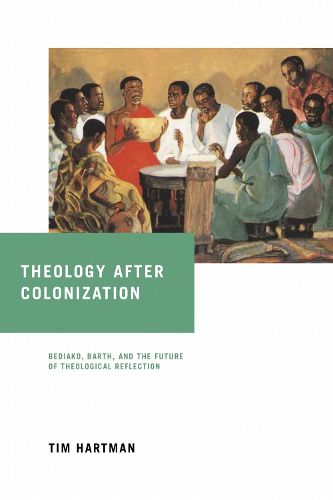Readings Newsletter
Become a Readings Member to make your shopping experience even easier.
Sign in or sign up for free!
You’re not far away from qualifying for FREE standard shipping within Australia
You’ve qualified for FREE standard shipping within Australia
The cart is loading…






Tim Hartman’s Theology after Colonization uses a comparative approach to examine two theologians, one from Europe and one from Africa, to gain insight into our contemporary theological situation. Hartman examines how the loss of cultural hegemony through rising pluralism and secularization has undermined the interconnection of the Christian faith with political power and how globalization undermined the expansive (and expanding) mindset of colonialization. Hartman engages Swiss-German theologian Karl Barth (1886-1968), whose work responded to the challenges of Christendom and the increasing secularization of Europe by articulating an early post-Christendom theology based on God’s self-revelation in Jesus Christ, not on official institutional structures (including the church) or societal consensus. In a similar way, Ghanaian theologian Kwame Bediako (1945-2008) offered a post-colonial theology. He wrote from the perspective of the global South while the Christian faith was growing exponentially following the departure of Western missionaries from Africa. For Bediako, the infinite translatability of the gospel of Jesus Christ leads to the renewal of Christianity as a non-Western religion, not a product of colonialization.
Many Western theologies find themselves unable to respond to increasing secularization and intensifying globalization because they are based on the very assumptions of uniformity and parochialism (sometimes called orthodoxy ) that are being challenged. Hartman claims Bediako and Barth can serve as helpful guides for contemporary theological reflection as the consensus surrounding this theological complex disintegrates further. Collectively, their work points the way toward contemporary theological reflection that is Christological, contextual, cultural, constructive, and collaborative. As one of the first books to examine the work of Bediako, this study will interest students and scholars of Christian theology, African studies, and postcolonial studies.
$9.00 standard shipping within Australia
FREE standard shipping within Australia for orders over $100.00
Express & International shipping calculated at checkout
Tim Hartman’s Theology after Colonization uses a comparative approach to examine two theologians, one from Europe and one from Africa, to gain insight into our contemporary theological situation. Hartman examines how the loss of cultural hegemony through rising pluralism and secularization has undermined the interconnection of the Christian faith with political power and how globalization undermined the expansive (and expanding) mindset of colonialization. Hartman engages Swiss-German theologian Karl Barth (1886-1968), whose work responded to the challenges of Christendom and the increasing secularization of Europe by articulating an early post-Christendom theology based on God’s self-revelation in Jesus Christ, not on official institutional structures (including the church) or societal consensus. In a similar way, Ghanaian theologian Kwame Bediako (1945-2008) offered a post-colonial theology. He wrote from the perspective of the global South while the Christian faith was growing exponentially following the departure of Western missionaries from Africa. For Bediako, the infinite translatability of the gospel of Jesus Christ leads to the renewal of Christianity as a non-Western religion, not a product of colonialization.
Many Western theologies find themselves unable to respond to increasing secularization and intensifying globalization because they are based on the very assumptions of uniformity and parochialism (sometimes called orthodoxy ) that are being challenged. Hartman claims Bediako and Barth can serve as helpful guides for contemporary theological reflection as the consensus surrounding this theological complex disintegrates further. Collectively, their work points the way toward contemporary theological reflection that is Christological, contextual, cultural, constructive, and collaborative. As one of the first books to examine the work of Bediako, this study will interest students and scholars of Christian theology, African studies, and postcolonial studies.